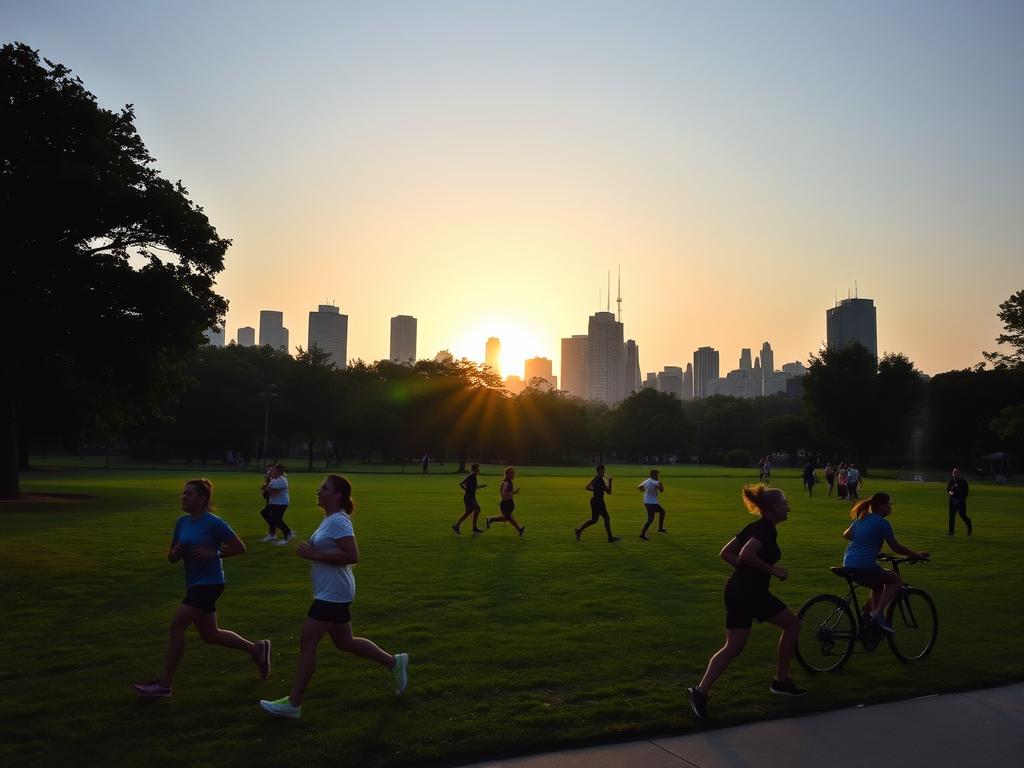Best Time to Exercise: Did you know that individuals who work out in the morning may consume fewer calories throughout the day? A study published in Medicine and Science in Sports and Exercise discovered that participants exercising in the morning were notably less distracted by food photos compared to days they didn’t engage in exercise at all. This intriguing finding underscores the potential influence of exercise timing on our daily habits and overall health. Understanding the optimal workout time can significantly enhance your fitness journey, enabling you to align with your body’s natural rhythms and goals.
With research showing that muscle function and performance peaks between 2 p.m. and 6 p.m., many people wonder, When is the best time to exercise? Morning workouts can kickstart metabolism and provide a sense of mental clarity, while afternoon and evening sessions are linked with greater strength and performance gains. Regardless of personal preferences or lifestyles, the cornerstone of fitness remains the same: establishing a routine that you find both enjoyable and sustainable. If you’re looking for effective strategies for personal development and fulfillment in your fitness journey, check out more about life goals examples here.
Key Takeaways
- Morning workouts can improve metabolism and reduce hunger-related distractions.
- Physical performance often peaks during the afternoon, making it an ideal time for strength training.
- Consistency in workout timing is essential for maximizing fitness gains.
- Evening exercise can lead to better sleep quality and longer sleep duration.
- Both morning and late workouts have distinct benefits, and finding your sweet spot is crucial.
Understanding Your Body’s Circadian Rhythms
Understanding body circadian rhythms is vital for optimizing performance. These rhythms dictate your body’s natural cycles, influencing various factors including energy levels and overall workout effectiveness. The timing of sleep and exercise can significantly affect your daily energy cycles. Analyzing these cycles can lead to improved fitness routines that enhance overall health.
How Sleep Affects Your Performance
Quality sleep plays an essential role in physical performance. Poor sleep can lead to decreased muscle function, slower recovery rates, and diminished effectiveness during workouts. Individuals with consistent sleep patterns harness their peak energy levels, particularly during morning workouts. Studies indicate that aligning exercise schedules with sleep can boost performance enhancement.
The Role of Hormones in Best Time to Exercise
Hormones and exercise timing are closely linked. Cortisol levels typically peak in the morning, making it a prime time for physical activity. Testosterone and workouts are particularly synergistic during early hours, supporting muscle building and fat loss. Understanding these hormonal fluctuations can aid in optimizing performance by choosing the right timing for workouts.
Finding Your Peak Energy Levels
Identifying your peak energy levels is crucial for effective exercise planning. Many discover their energy peaks at different times throughout the day, influenced by various factors. Research shows that body temperature and metabolic rates elevate during the day, allowing for improved performance in the afternoon. Observing personal energy cycles helps strategically create a workout schedule that aligns with natural rhythms. Incorporating stretching at optimal times can further enhance workouts and prevent injuries.

Morning Workouts: Benefits and Drawbacks
Morning workouts offer numerous advantages that entice many to rise with the sun. Engaging in physical activity early not only gives a metabolism boost but can also pave the way for a productive day. As individuals begin their routines, they may find that the metabolic activity initiated by exercising enhances calorie burning throughout the day.
Boosting Your Metabolism Early
The metabolism boost achieved through morning workouts plays a pivotal role in achieving fitness goals. Research suggests that exercising before breakfast may increase fat metabolism, supporting those who seek weight loss. This energizing start encourages healthy choices throughout the day, setting a positive tone. Furthermore, regular morning exercise can lead to consistent caloric burn, reinforcing one’s overall fitness journey.
Mental Clarity and Focus
Engaging in morning workouts is linked to improvements in mental clarity and focus as the day progresses. The release of endorphins during these sessions can elevate mood and cognitive function, enhancing motivation for the tasks ahead. Exercisers often report heightened focus, making it easier to tackle daily challenges. The benefits of this mental engagement are substantial, as morning activity can lead to improved attention and productivity throughout the day. For those interested in understanding the full extent of these cognitive benefits, exercise plays a crucial role in optimizing brain health.
Potential Challenges of Morning Exercise
Despite the notable morning exercise advantages, certain barriers to early workouts must be acknowledged. For some, overcoming workout timing issues can present challenges, including sleep deprivation or difficulty adjusting sleeping patterns. Early alarms often lead to hitting the snooze button, which can disrupt morning routines. Additionally, a proper warm-up period may be necessary, as muscles may initially be stiff after sleep. To navigate these morning exercise challenges, planning and discipline are key. Establishing a new habit takes time, potentially requiring three to four weeks to adjust successfully. Consistent nightly rest will support this transition; thus, getting adequate sleep becomes essential.

| Benefits of Morning Workouts | Potential Drawbacks |
|---|---|
| Boosts metabolism for increased calorie burn | Requires an early wake-up time |
| Enhances mental clarity and focus throughout the day | May lead to sleep deprivation if not managed |
| Encourages healthier food choices | Possibly requires longer warm-up periods |
| Fewer distractions for a consistent routine | Adjustment period of 3-4 weeks is needed |
Morning exercise can lead to a healthier mindset, making it an appealing option. Balancing the benefits with the inherent challenges ensures a well-rounded approach to health and fitness.
Afternoon and Evening Exercise: Pros and Cons
Exploring the advantages and disadvantages of exercising in the afternoon and evening reveals beneficial insights. Many individuals turn to these times for their workouts, tapping into peak strength times and various social opportunities that can enhance their overall fitness experience.
The Impact on Performance and Strength
Afternoon exercise performance often surpasses morning capabilities. Body temperatures peak in the late afternoon or early evening, which contributes to improved strength and flexibility. Research indicates that hormone levels, including testosterone, are conducive to better muscle gains during these periods. In this context, individuals can optimize their training regimes to incorporate both cardio and resistance training effectively.
Stress Relief After a Long Day
After a demanding day, evening workouts provide essential stress relief. Engaging in physical activity allows individuals to release tension and decompress. This post-work exercise can serve as a powerful remedy, empowering individuals to handle stress better and foster relaxation. Evening workouts for relaxation stimulate the release of endorphins, enhancing mood and emotional well-being.
Social Opportunities and Group Classes
Evening workouts introduce unique social benefits of working out. Many group exercise classes are scheduled later in the day, offering fun and interactive ways to stay motivated. The evening workout socialization aspect brings together people who share similar fitness goals, creating a community environment that encourages consistency and enjoyment in exercising.
Finding the right exercise schedule is critical for achieving personal fitness goals. Individuals looking to integrate more physical activity into their lives can consider joining group classes or participating in local sports. Implementing positive daily habits can heighten both the physical and mental benefits derived from a structured workout routine.
As the evening workout routine develops, consider how it aligns with overall lifestyle choices. Practicing regular physical activity boosts mood and energy levels, contributing to a healthier, more fulfilling daily life. Mental health advantages from regular evening exercise reinforce its value, encouraging individuals to stay active and engaged.
Tailoring Your Exercise Schedule to Your Goals
To achieve your fitness objectives, developing an exercise schedule tailored to your individual goals is essential. Whether you aim for weight loss, muscle gain, or endurance training, creating a plan that suits your needs will enhance your results.
Weight Loss vs. Muscle Gain
For an effective exercise schedule for weight loss, morning workouts may offer optimal benefits. Studies highlight increased fat oxidation during early exercise sessions, making them ideal for shedding pounds. In contrast, individuals focused on muscle gain can achieve better outcomes through afternoon or evening workouts, aligning their training with peak testosterone levels. This timing allows for the execution of muscle gain workouts that maximize strength output, essential for building lean muscle mass.
Training for Endurance Events
Those preparing for marathons or other endurance events should adopt an endurance training schedule that considers workout timing. Research indicates that the late afternoon is often the perfect time for longer training sessions. At this hour, the body typically experiences higher temperature and energy availability, enhancing performance during optimized endurance workouts. Balancing cardio and strength training remains vital for comprehensive endurance preparation.
Adjusting Your Routine for Recovery
Incorporating proper exercise recovery methods is crucial for a balanced fitness regimen. Adjusting your routine to prioritize recovery enhances overall performance by boosting muscle repair. Lighter, lower-intensity sessions in the early morning or evening can improve recovery while preparing you for more intense workouts. Listening to one’s body signals during exercise will foster tailored workout strategies that align with recovery needs. For more insights on this topic, refer to guidelines to prevent common sports injuries and optimize your progress.

| Goal | Best Time for Workouts | Key Benefits |
|---|---|---|
| Weight Loss | Morning | Increased fat oxidation |
| Muscle Gain | Afternoon/Evening | Enhanced strength output |
| Endurance Training | Late Afternoon | Optimal temperature and energy levels |
| Recovery | Early Morning/Evening | Better muscle repair |
Tips for Finding Your Optimal Workout Time
Identifying your optimal workout timing relies on actively listening to your body’s signals. Factors such as energy levels, fatigue, and even personal preferences can influence when you feel most prepared to exercise. By tuning into these body signals for workouts, you can adjust your exercise schedule, making it more effective and enjoyable. Understanding your reactions to various workout times fosters a sense of intuitive exercise planning, ensuring you get the most out of each session.
Listening to Your Body’s Signals
Being mindful of how your body responds during different times of the day can significantly help in fine-tuning your fitness itinerary. Engaging in workout time experimentation allows you to uncover your peak moments of energy. This information can be particularly valuable for establishing an exercise routine that suits your lifestyle and maintains exercise consistency throughout your week.
Experimenting with Different Times
To discover the best time for your workouts, try testing workout schedules that vary from morning to evening. Studies indicate that exercising in the morning can enhance your metabolism and lead to increased activity levels throughout the day. Alternatively, exercising in the afternoon or evening may optimize your physical performance, allowing for improved strength and endurance during your sessions. This adjusting exercise times approach promotes a balanced routine tailored to your unique needs.
Creating a Sustainable Routine
Building a sustainable workout routine is key to achieving long-term fitness planning. By aligning your exercise times with personal schedules and preferences, you can foster more enjoyment and commitment to your fitness journey. Incorporating a variety of workouts throughout the week not only makes the regimen less monotonous but also helps in avoiding burnout or exercise fatigue. Ultimately, the focus should be on creating a balanced routine that fits seamlessly into your daily life.











